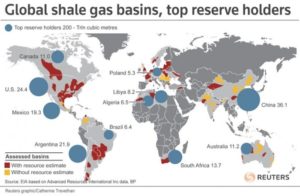Russisch aardgas ter substitutie van Gronings gas is een optie die niet zonder zorgvuldige afweging van pros en contras zou dienen te worden verworpen.
 Door de preoccupatie met de uitputting van de Groningse gasvelden, de aardbevingen aldaar en de demonisering van CO2 wegens de door dit groeigas vermeende substantiële opwarming van de aarde (die maar steeds niet wil komen), zou men bijna vergeten dat de leveringspatronen van gas ook nog een geopolitieke dimensie hebben. De Amerikanen kijken daarnaar vanuit een wat ander perspectief dan wij.
Door de preoccupatie met de uitputting van de Groningse gasvelden, de aardbevingen aldaar en de demonisering van CO2 wegens de door dit groeigas vermeende substantiële opwarming van de aarde (die maar steeds niet wil komen), zou men bijna vergeten dat de leveringspatronen van gas ook nog een geopolitieke dimensie hebben. De Amerikanen kijken daarnaar vanuit een wat ander perspectief dan wij.
Onder de titel, ‘Can The U.S. Break Russia’s Gas Monopoly In Europe?’ schreef Tim Daiss voor Oilprice.com:

Rick Perry.
In a statement that is sure to provoke Russian backlash, while also sending a strong message to both Moscow and European energy markets, Department of Energy (DOE) Secretary Rick Perry said on Thursday before the Senate Armed Services committee that moving U.S. energy supplies into Eastern Europe is one of the more powerful ways to contain Russian influence.
He also agreed that Russian cyberattacks on the U.S. energy sector were “an act of war.” His comments come just a week after the U.S. Treasury Department revealed that so–called Russian government actors targeted “multiple U.S. critical infrastructure sectors, including the energy, nuclear, commercial facilities, water, aviation, and critical manufacturing sectors” with cyberattacks at least since March 2016.
A report in UPI last week said that a ransomware cyberattack from the Petya or NotPetya bug targeted thousands of government and private corporate servers across the globe in 2017. The attack demanded a ransom paid in Bitcoin to release the encryption imposed by the virus that prevents users from accessing their devices. The U.S. Treasury claims the NotPetya attack was attributed to the Russian military.
“An energy policy where we can deliver energy to Eastern Europe, where we are a partner with people around the globe, where they know that we will supply them energy and there are no strings attached is one of the most powerful messages that we can send to Russia,” Perry added in his remarks on Thursday.
Gas as a geopolitical weapon
The National Defense Authorization Act has said that U.S. efforts should promote energy security in Europe, stating Russia uses energy “as a weapon to coerce, intimidate and influence” countries in the region. …
… challenging Russia’s dominance in European gas markets is no small feat – even for the U.S. which by the end of the decade will have as many as five major LNG exports projects operational, thus becoming the third largest LNG exporter after Qatar and Australia.
Russia’s gas exports to Europe rose 8.1 percent last year to a record level of 193.9 billion cubic metres (bcm), despite rising competition and concerns about the country’s dominance of supply, the London-based Financial Times recently reported.
The report added that Russian state-run gas giant Gazprom, the world’s largest natural gas producer, has a monopoly over Russia’s network of pipelines to Europe and supplies nearly 40 percent of Europe’s gas. However, Gazprom has been forced to lower its prices in recent years to protect its market share in the face of moves by EU member states to buy more gas from the U.S., Qatar and other producers. …
Economic factors also come into play. As discussed last week, American LNG is at a cost disadvantage compared to Russian piped gas. Using a Henry Hub gas price of $2.85/MMBtu as a base, Gazprom recently estimated that adding processing and transportation costs, the price of U.S.-sourced LNG in Europe would reach $6/MMBtu or higher – a steep markup.
Henry Hub gas prices are currently trading at $2.657/MMBtu. Over the last 52-week period U.S. gas has traded between $2.602/MMBtu and $3.82/MMBtu. Russian gas sells for around $5/MMBtu in European markets and could even trade at lower prices in the future as Gazprom removes the commodity’s oil price indexation.
Aldus Tim Daiss.
Lees verder hier.
In de energiediscussie wordt het risico van overmatige afhankelijkheid van gas en olie uit Rusland vaak hoog opgespeeld. Ook in de klimaatdiscussie wordt het argument vaak gebruikt door de pleitbezorgers van zogenaamde duurzame energie als alternatief voor olie en gas.
Gazprom levert thans 40% van het Europese gas. Toch zijn mij geen gevallen bekend dat het bedrijf deze dominante marktpositie heeft gebruikt als instrument om (politieke) invloed op West-Europa uit te oefenen.
Daarbij moet worden bedacht dat handel tweezijdige afhankelijkheid schept. Voor het behoud van hun welvaart en sociale stabiliteit zijn de Russen even afhankelijk van ongestoorde levering als wij.
Conclusie: Russisch aardgas ter substitutie van Gronings gas is een optie die niet zonder zorgvuldige afweging van pros en contras zou dienen te worden verworpen.


2 reacties :
Alsof Midden-Oosten olie niet als politiek wapen gebruikt wordt; kijk maar om je heen wat er allemaal gebeurt. En Amerikanen zijn geen haar beter; die zullen ongetwijfeld, mochten wij van hen afhankelijk worden, dezelfde geo-politieke trucs gebruiken - voor zover dat al niet het geval is. En dan de meest boosaardige oplossing bedenken die mogelijk is; windmolens etc. opstellen en subsidie geven c.q. extra belasting heffen om die ondingen te financieren die bovendien niets opbrengen en/of bijdragen aan de oplossing van de CO2 leugen. Overigens, waarom zou je een leugen oplossen als dat geld in het laatje brengt? Veel te veel grootkapitalisten, banken en politici hebben er intussen belang bij de nieuwe waarheid in stand te houden.; dus
Een nieuw Nederlands spreekwoord:
Al is de waarheid nog zo snel, de HAAGSE leugen achterhaald hem wel.
Een reactie posten